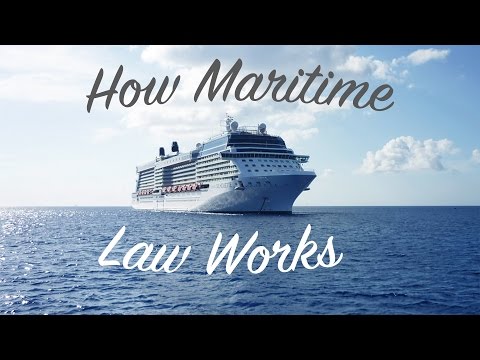
Understanding the Applicability of Maritime Law in the United States
Welcome, curious reader, to this informative article on the intriguing world of maritime law in the United States. Before we embark on this journey, it is important to note that while this article aims to provide a comprehensive overview, it is always advisable to cross-reference with other sources or seek guidance from legal advisors to ensure accuracy in your specific situation.
What is Maritime Law?
📋 Content in this article
Maritime law, also known as admiralty law, is a distinct and specialized branch of law that governs legal matters concerning activities and disputes occurring on the high seas and other navigable waters. It is a captivating field that has evolved over centuries, adapting to the ever-changing nature of maritime commerce and activities.
The Scope of Maritime Law
Maritime law encompasses a wide range of issues, including but not limited to:
1. Maritime Commerce: This facet of maritime law governs commercial activities on the high seas and navigable waters. It covers disputes arising from contracts, shipping agreements, cargo claims, and international trade regulations.
2. Maritime Personal Injury: When accidents occur at sea or on navigable waters, maritime law addresses legal issues related to personal injuries, such as those suffered by seafarers, passengers, or workers on offshore platforms. Special regulations ensure fair compensation for the injured parties.
3. Maritime Environmental Law: Given the environmental risks associated with maritime activities, this branch of law focuses on pollution prevention, liability for oil spills, preservation of marine ecosystems, and compliance with international treaties and conventions.
4. Maritime Criminal Law: Crimes committed at sea fall under maritime criminal law jurisdiction. These offenses include piracy, drug trafficking, smuggling, and illegal fishing. International cooperation plays a crucial role in combating maritime crime.
Jurisdiction and the Courts
Maritime law in the
Understanding the Application of Maritime Law in the United States
Understanding the Applicability of Maritime Law in the United States
Maritime law, also known as admiralty law, is a specialized area of law that governs activities and disputes that take place on navigable waters. These waters include oceans, seas, rivers, and lakes that are used for interstate or international commerce. The United States has a rich history of maritime law that is based on both statutory laws and legal precedents.
Maritime law in the United States is applied to a wide range of activities and situations, including but not limited to:
Maritime law in the United States is a unique blend of federal and state laws.
Understanding the Maritime Law of the United States: A Comprehensive Overview
Understanding the Applicability of Maritime Law in the United States
Maritime law, also known as admiralty law, governs legal matters and disputes that arise in relation to navigable waters, including oceans, seas, rivers, and lakes. It is a specialized branch of law that deals with various aspects of maritime activities, such as shipping, marine commerce, and maritime accidents.
Understanding the applicability of maritime law in the United States is crucial for individuals and businesses involved in maritime activities. Here is a comprehensive overview of this complex area of law:
1. Jurisdiction: Maritime law applies to both domestic and international waters. In the United States, federal courts have exclusive jurisdiction over maritime cases. This means that these cases are heard and decided by federal judges. However, there are also state laws that may come into play when dealing with maritime matters that occur within state waters or involve purely local issues.
2. Sources of Law: Maritime law in the United States is derived from a variety of sources, including federal statutes, international conventions, judicial decisions, and customary practices. The most significant federal statute governing maritime law is the Jones Act, which protects seamen injured in the course of their employment.
3. Maritime Contracts: Maritime law governs various types of contracts related to maritime activities, such as charter parties, bills of lading, salvage contracts, and marine insurance policies. These contracts are subject to specific rules and regulations under maritime law.
4. Maritime Personal Injury: If you suffer an injury while working at sea, you may have rights under maritime law. The Jones Act provides protection for seamen injured due to negligence or unseaworthiness of the vessel. Additionally, the Longshore and Harbor Workers’ Compensation Act covers workers injured on navigable waters but not considered seamen.
5. Maritime Accidents: Maritime law also deals
Title: Understanding the Applicability of Maritime Law in the United States: A Reflection
Introduction:
Maritime law, also referred to as admiralty law, plays a critical role in regulating activities on and pertaining to navigable waters. It encompasses a wide range of legal issues, including commerce, navigation, marine accidents, and environmental concerns. Understanding the applicability of maritime law in the United States is crucial for various stakeholders, including maritime businesses, sailors, lawyers, and policymakers. Staying current on this topic is essential to navigate the complex and ever-evolving legal landscape. However, readers are reminded to verify and cross-reference the content of this article, as laws can change over time.
I. The Scope of Maritime Law:
Maritime law covers a broad range of legal matters related to activities on navigable waters. It applies to both domestic and international waters under the jurisdiction of the United States. Navigable waters include not only oceans but also rivers, lakes, and other waterways that allow for the transportation of goods and passengers.
II. Admiralty Jurisdiction:
Admiralty jurisdiction refers to the authority of federal courts to hear cases involving maritime law. Federal courts have exclusive jurisdiction over admiralty and maritime matters, ensuring uniformity in the interpretation and application of the law across the United States. To establish admiralty jurisdiction, the following factors must be present:
III. Key Areas of Maritime Law:
1. Maritime Commerce:
Maritime commerce comprises various activities, including shipping, international trade, chartering vessels, and marine insurance. Maritime law governs contracts, disputes related to cargo carriage, bills of lading, charter parties, and collisions involving vessels.
2.
